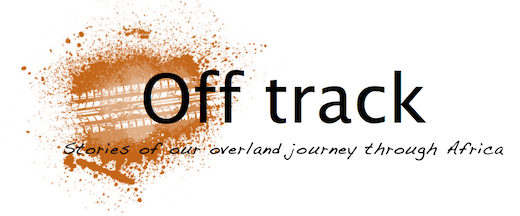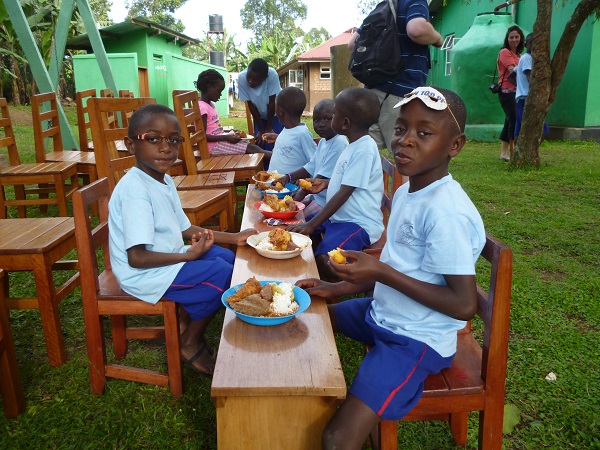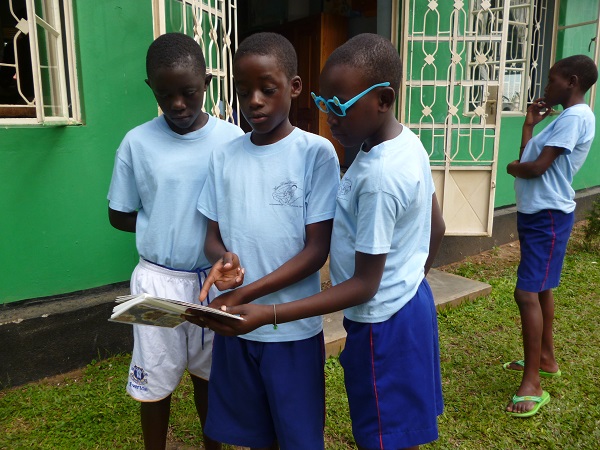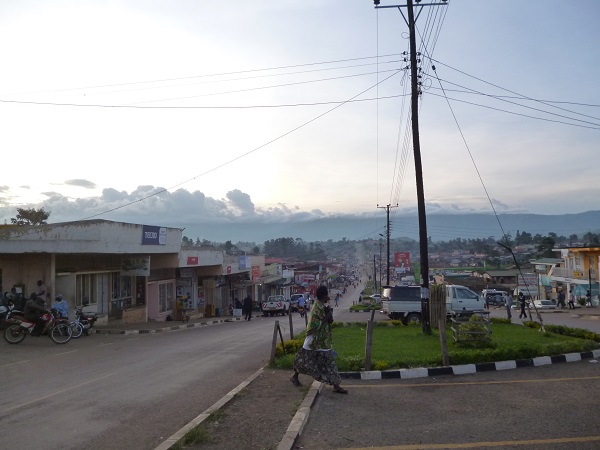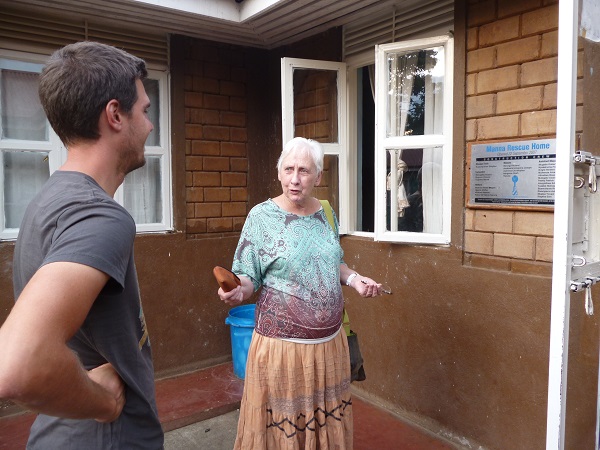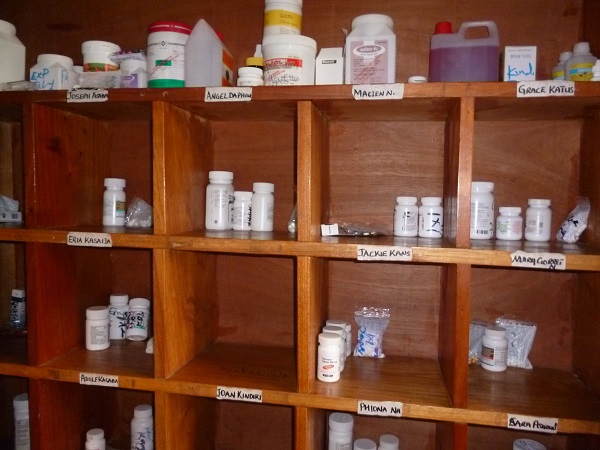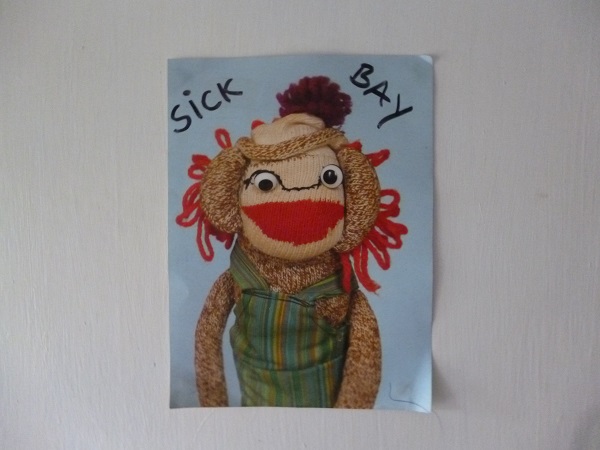Meeting Carol and ‘her’ kids in Fort Portal
‘Do you see that palace?’ from the car window we can see a round building on a hill overlooking the city. ‘It is the home of the queen of this kingdom here. Completely renovated. A few years ago the king was killed by his brother and the palace was destroyed completely. Its rebuilding was fully financed by Colonel Gaddafi’. We look surprised, we don’t understand. Why Gaddafi? We knew he had strong ties to the former Field Marshall and dictator Idi Amin, but why this local king? ‘Oh that’s easy’, Carol explains, ‘he was having an affair with the queen. But that’s not the whole story’, Carol continues.
Before the rebuilding started, Gaddafi, a cruel and paranoid man, wanted to make an offer (to whom? The gods, Allah, the spirits?). Goal: to be ‘granted’ a flawless project. Not much later, word on the street was that he had ordered to sacrifice four babies, their heads were to be given Gaddafi for good luck. ‘Yet this story was so horrifying, so diabolic, that no one really believed it’, said Carol, ‘neither did I, until the day I saw the picture in the newspaper’. So what happened: the killer had walked along the main road where a young mother was selling some food, her baby lying at her feet. In broad daylight, the assassin had snatched the baby and before the woman could react, he had chopped of the head with a machete. He tried to run off with the head, but in a few seconds, bystanders formed a crowd and cornered the man. There, right at the spot, the furious mob lynched the man.
The next day, the local newspaper published the photo of the lynched killer lying on the pavement, the decapitated baby a few feet away. ‘That’s where it happened, the bodies were lying just…there’. While driving, Carol is pointing a a spot at the side of the main street from Fort Portal to Kasusu. I felt as if I just swallowed a large stone. Carol shook her head slowly: ‘that’s just one of the many horrors that happened here, and are still happening every day around Uganda.’
We are in Fort Portal, a small town in the western region of Uganda. Because of the height, the air is cool, the landscape is lush and green, heavy clouds around the Rwenzori Mountains (5100 m high) form beautiful sky art. We love it here. Not only because the surroundings remind Cornelius of home in South Germany, but also because we getting to know the Ugandans better. And we are impressed to see their kindness, openness and most of all, resilience.
We are at the Youth Encouragement Services (YES) hostel, from where owner Carol runs several projects aiming to give children a chance at a good future. Or even a future at all. Carol is an American lady who has been here for 18 years and in that time she has facilitated schooling for dozens of kids and agricultural support for again dozens of families. Besides that, she runs an orphanage for HIV positive children.
It is very difficult for children that are born with HIV to survive here. Not only because they are malnourished and medication is not available or of bad quality, but also because of the social isolation. Often they are orphans and are in the care of their extended families who often don’t treat them well. Some families starve the children, since ‘they are going to die soon anyway’. The scarce food should therefore be given to healthy children. Sometimes the parents suffer from mental illnesses as a result of progressed Aids. People here believe that mental illnesses are the evil work of spirits, that people are possessed, or bewitched. And that this is transferrable, in the blood. So if one of the parents is aggressive or acting schizophrenic, they want to get rid of the child as well. And starvation, sending them away, or sometimes even killing them is their way to protect the family.
When Carol hears of children facing such a threat, she takes them into her rescue home. There they are well fed, treated and put on a list for adoption.
Carol drove us to the orphanage to show us around. The home had two large dorms, a kitchen, dining room, playgrounds, examination rooms and a sick bay. Sick bay? Aren’t they all sick? I thought naively. I didn’t really have an image of how HIV shows itself in children. Perhaps I expected them to lie around, coughing, looking miserable. But at the home we found a healthy looking, shy but active bunch of little ones. And yes, some had rashes on their heads and they were all small for their age, but apart from that, you couldn’t have guessed that they are on loads of pills everyday.
In the hostel we met 3 American couples who are here to adopt HIV positive kids from Carol’s home. One of the mothers told us that they already adopted their daughter 8 months ago, and found out that she had a brother here. He is not HIV positive, but in a very abusive situation. So they’re trying to adopt him too, but adoption has become very difficult. ‘There is a new judge here, who is convinced that Ugandan children should stay in Uganda’, Sheila explained. Carol added that another reason the government is now reluctant, is because they want to bring a halt to the child trafficking, selling them for organ donation. Through illegal ‘adoptions’ or just after snatching children from villages, children are brought to neighbouring countries where it is said that Western families come to save their own child.
Cornelius and I have many discussions about the effectiveness of NGOs. There are many shades of grey, but to put it simply, we are both not convinced that volunteering and NGOs are the right way to accelerate development in these countries. Except when situations are so acutely life-threatening for many people and the government or tribes are too busy waging wars at the costs of their own peoples (like in Rwanda or in Darfur). In fact, we believe that it is rather counterproductive, because it gives governments an excuse to neglect their responsibilities, as the Western countries are conveniently stepping in. Why should NGOs take care of their people in need, when the government has all resources, possibilities and political stability to do it themselves?
A local pastor answered that question clearly: ‘the governments are dedicated to different priorities, mostly their own priorities, thereby keeping their resources from the people who need it most. And that’s why other people should step in: to keep children from being neglected and killed everyday’.
Although our opinions haven’t really changed, I still have great admiration for people like Carol who dedicate their life to giving a few children a future, for families like the Americans who take on the risk, cost and hassle of adopting HIV positive children. For the volunteers who try to get the kids to believe that they do have a value and that they are not worthless.
Cornelius is getting restless and wants to move on, maybe because he fears that I will grow soft and start doing some volunteering, and drag him into it, haha 🙂 So tomorrow we pack and drive towards the crater lakes. Both looking forward to do some trekking in beautiful nature again.
